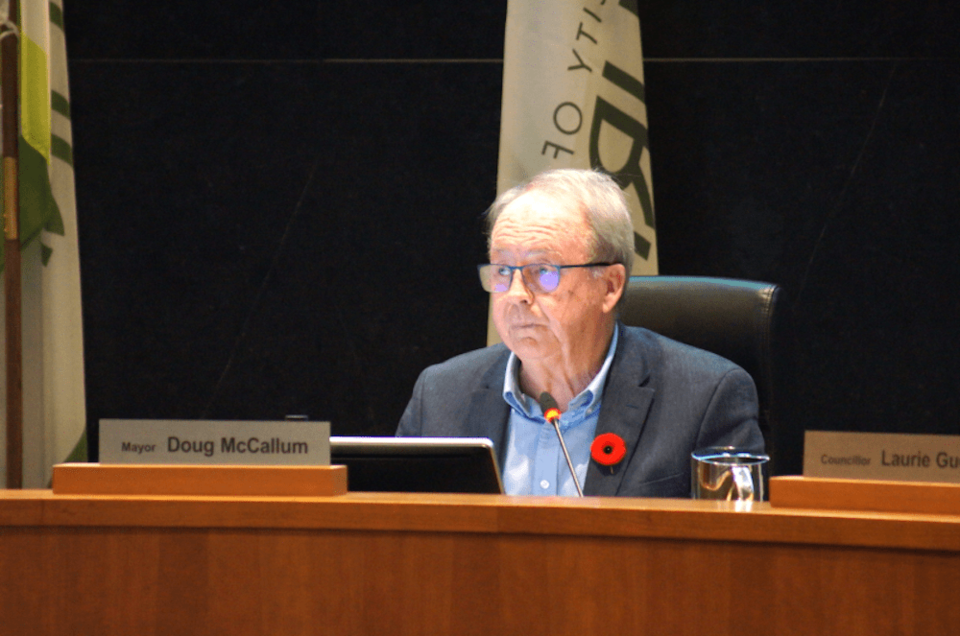Metro Vancouver mayors nearly unanimously agreed Thursday to implement a regional business licence for ride-hailing vehicles and companies, such as Uber and Lyft.
The only dissenting voice was Surrey Mayor Doug McCallum, and it’s not yet clear what the impact will be in not having the largest municipality participating in the inter-municipal business licence (IMBL).
The Mayor’s Council voted in favour of the licence due to four objectives outlined in a report tabled at Thursday’s public meeting: to ensure seamless travel across municipal boundaries; to minimize regulatory burden; to fit ride-hailing in more concisely with regional transit networks; and to secure management of travel data to respond to travel pattern changes.
The report notes that provincial law precludes municipalities from prohibiting ride-hailing companies outright or regulating the number of vehicles. However, the law allows municipalities to license the vehicles and companies on a cost-neutral basis. Cities may also regulate the vehicles through street and traffic bylaws. And, notably, no municipality is compelled to join the IMBL for ride-hailing.
McCallum has previously said he does not intend to license the vehicles and is seeking legal clarity on the matter.
If Surrey is compelled to license ride-hailing vehicles and companies, it’s possible more regulations could be imposed to dissuade their use within municipal boundaries. Furthermore, those with an IMBL but not a City of Surrey business license couldn’t operate in Surrey.
McCallum’s stated concerns include protecting the taxi industry, which is largely based in Surrey, as well as traffic congestion.
He is at odds with the city’s largest business lobby group.
“Surrey needs ride-hailing and transportation options in the face of continued delays for transit infrastructure. This is a step in the right direction for ride-hailing implementation across Metro Vancouver,” said Surrey Board of Trade CEO Anita Huberman. “The Surrey Board of Trade is pleased with today’s Mayor’s Council vote in favour of innovation and facts.”
The IMBL is expected to take several months to develop, and during this time, the provincial government could finally greenlight companies to operate. As such, TransLink staff are encouraging municipalities to be as consistent as possible in setting up their own licensing bylaws.
Vancouver has already established a licensing model. The city charges $155 per company and $100 per vehicle plus a 30-cent “curb access fee” between 7 a.m. and 7 p.m. Meanwhile, the Tri-Cities have agreed to a sub-regional licence.
A next step for the IMBL may involve including neighbouring municipalities outside Metro Vancouver but within the same Zone 1 region established by the provincial government, such as Squamish and Chilliwack.
The Mayor’s Council has already repeatedly expressed concerns about ride-hailing adding to traffic congestion in the region.
The report to the mayors notes: “The current B.C. framework does not explicitly address the now well documented challenges seen in other cities, namely an increase in traffic and congestion, especially in urban centers and during peak periods. Studies have shown that for every 1 km of auto travel that TNS [transportation network service, i.e. ride-hailing] companies are able to remove, they add 2.3 km of additional auto travel, primarily owing to cruising for trips and dead-heading following drop-offs.”
This year, the Mayors’ Council recommended that the Passenger Transportation Board (PTB) – the regulator for ride-hailing – allow for “congestion-based per-trip fees.”
However, “the PTB chose not to enact this key element of the Mayors’ Council recommendations, and so a growth in traffic congestion remains a key concern that local governments will need to manage using the tools the province has provided them.”



